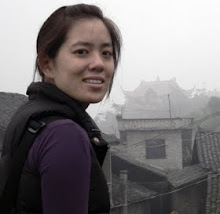 The sidewalk of a non-litigious society.
The sidewalk of a non-litigious society.I stand out in Rwanda, though not as much as I'd thought. There is a lot of development happening over here, and it's mainly being funded by Chinese companies. New beautifully paved roads are popping up overnight, and the miles of sidewalks accompanying them are built of meticulously laid, patterned bricks. It's not a surprise then that much of the new construction reminds me of what you find in parts of Guangzhou. The similarities extend all the way down to the widespread use of papaya trees and purple-leaved succulents in the landscaping.
Unlike in other parts of the world, the terms of the foreign development contracts keep the majority of the profits in Rwanda, while requiring a high reliance on local labor. These are concessions American and European companies were not willing to make, and so China is really getting a strong foothold. So far, the relationship appears to be going well, as I am greeted very warmly by everyone. No one really gets that I'm an American.
Still, there are far fewer Asian people than traditional muzungu here on the streets. While I am interesting enough to gawk at, I am apparently still not as captivating as people of European descent. A white colleague told the story of being packed next to a woman and her friend on one of the crowded, public minibuses. The woman rather boldly stroked my colleague's hand a few times before telling her friend, "I wanted to touch one before I died." "What does it feel like?" the friend asked. "Like a ripe banana," the woman said.
Unlike in other parts of the world, the terms of the foreign development contracts keep the majority of the profits in Rwanda, while requiring a high reliance on local labor. These are concessions American and European companies were not willing to make, and so China is really getting a strong foothold. So far, the relationship appears to be going well, as I am greeted very warmly by everyone. No one really gets that I'm an American.
Still, there are far fewer Asian people than traditional muzungu here on the streets. While I am interesting enough to gawk at, I am apparently still not as captivating as people of European descent. A white colleague told the story of being packed next to a woman and her friend on one of the crowded, public minibuses. The woman rather boldly stroked my colleague's hand a few times before telling her friend, "I wanted to touch one before I died." "What does it feel like?" the friend asked. "Like a ripe banana," the woman said.









